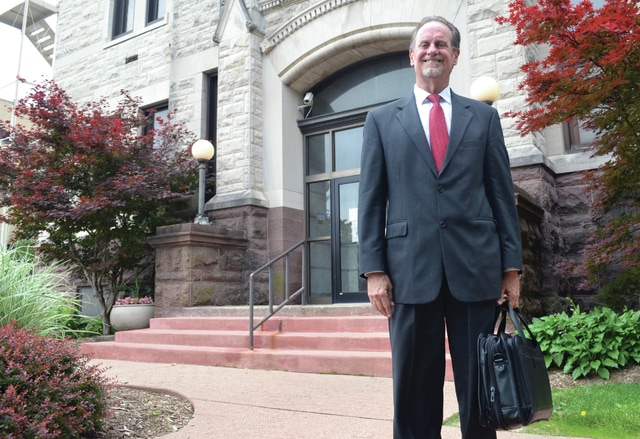
XENIA — For most people, talking under a judge while he or she is conducting a court hearing would be a good way to get kicked out of the courtroom. For Bill Hargis, it’s a way of life.
As Hargis murmurs to the defendant sitting next to him, he’s on the clock. Hargis is a court interpreter, and while his services aren’t used every day in Greene County, they’re still a critical function of justice when they’re necessary.
On this particular June day, Hargis is in Judge Michael Buckwalter’s courtroom in Greene County Common Pleas Court to interpret for Jesus Villasenor, a Spanish-speaking man who recently pleaded guilty to charges related to a fake ID production operation in the area.
Just prior to sentencing, Judge Buckwalter asks Villasenor if there’s anything he would like to say on his behalf.
Through Hargis, Villasenor apologizes for his actions.
“I am grateful for the United States and everything that they have given me,” Hargis says, interpreting for the other man, while listening to his next comments. “I am very sorry for what I did. If I could go back in time, I would never have done it. I ask the United States to forgive me.”
Soon the sentencing hearing wraps up and Hargis’ work is done. While the interaction is brief, it’s illustrative of how important that translation is to the court’s work. Without the interpreter, the court has an incomplete picture of the case.
In many ways, Hargis and interpreters like him hold their defendant’s life in their hands. A slip of the tongue or a misinterpretation of an idea could mean extra months or years in prison. Accuracy is critical.
With that pressure, is the idea of being a court interpreter intimidating?
“Absolutely,” Hargis said. “Especially when you first walk into court the very first time.”
Hargis, years and many court hearings removed for that first court interpreting experience, is now a veteran freelance interpreter, primarily in courts in the Miami Valley. Over the years, he’s translated for traffic ticket hearings, capital murder cases and just about everything in between.
“You have to make quick decisions”
Interpreters have to be able to communicate in three modes, according to Hargis. Sight translation requires reading a document and verbally interpreting into another language. Consecutive translation has an individual speak before pausing to allow for the translation. Simultaneous translation, which Hargis estimates to be about 90 percent of what court interpreters do, requires live translation as something is being said, without pausing.
Each mode presents its own unique challenges, but all require nimble thinking.
“You have to make quick decisions on words that are said,” Hargis said. “One of the keys to being a good interpreter is understanding that we interpret meaning. We don’t interpret words, per se, because words can have different meanings. The issue of taking one word and replacing it with another word … we can’t do that. We can’t interpret word for word, literal, because we don’t live like that, words aren’t spoken like that in any language.”
Interpreters are typically certified through the Ohio Supreme Court, which sets standards and guidelines for the use of interpreters throughout the state.
When in court, an interpreter will take an oath prior to the proceedings to interpret accurately and completely.
It all takes quick thinking and a certain amount of humility.
“You have to be willing to say, ‘I made an error,’ ” Hargis said. “I’ve done that in court. And we’re required to do that in court. If we realize that it’s an error, then I say, ‘Your honor, the interpreter needs to correct the record.’ ”
The administration of justice
While courts in Greene County don’t run into the need for court interpreters every day, using them is an important part of the judicial process, according to local law enforcement officials.
Greene County Adult Probation Director Melissa Litteral reported that as of July 13, in 2016, seven defendants at the common pleas court level have needed an interpreter an average of 3-5 times each. A Xenia Municipal Court official reported that 4-6 cases required an interpreter in 2015.
“Due process is such an important process to citizens, whether you’re here legally or undocumented,” Litteral said. “The administration of justice is the most important aspect of the judicial branch, and we want to make sure every citizen is treated fairly.”
“They’ve got rights and whether they’re U.S. citizens or not,” Judge Buckwalter said. “If [the administration of justice] doesn’t happen, then you’re going to wind right back [in the original court] again on a reversal, which no one wants….”
“I love to interpret”
While the concept of court interpreting might be intimidating at times, Hargis is passionate about the profession. He’s the president of Community and Court Interpreters of Ohio, a non-profit association for interpreters in the state, and does what he can to advocate for the work that interpreters do.
“I love to interpret,” he said. “I love what I do. It’s only part of what I do in my life, but I have a passion for it. I try to communicate that passion to all the other interpreters and everybody I meet. That’s what keeps me coming back.
“I do believe there is something in our country called due process and that every person has a right to due process. That doesn’t matter if it’s a person that speaks English that is accused of a crime or a limited English proficient individual that is accused of a crime. All of them have that right to due process. As an interpreter, I facilitate that, and I help the court and this due process as the defendant goes through this whole process.”


